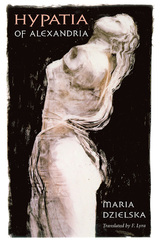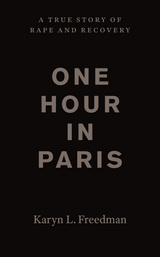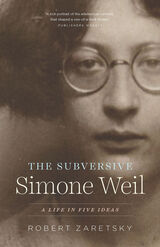
Duran devotes one chapter to each philosopher and provides a sustained critical analysis of her work, utilizing aspects of Continental theory, poststructuralist theory, and literary theory. She situates each philosopher within her respective era and in relation to her intellectual contemporaries, and specifically addresses the contributions each has made to major areas such as metaphysics/epistemology, theory of value, and feminist theory. She affirms the viability and importance of recovering these women's overlooked work and provides a powerful answer to the question of why the rubric "women philosophers" remains so valuable.

Hypatia—brilliant mathematician, eloquent Neoplatonist, and a woman renowned for her beauty—was brutally murdered by a mob of Christians in Alexandria in 415. She has been a legend ever since. In this engrossing book, Maria Dzielska searches behind the legend to bring us the real story of Hypatia's life and death, and new insight into her colorful world.
Historians and poets, Victorian novelists and contemporary feminists have seen Hypatia as a symbol—of the waning of classical culture and freedom of inquiry, of the rise of fanatical Christianity, or of sexual freedom. Dzielska shows us why versions of Hypatia's legend have served her champions' purposes, and how they have distorted the true story. She takes us back to the Alexandria of Hypatia's day, with its Library and Museion, pagan cults and the pontificate of Saint Cyril, thriving Jewish community and vibrant Greek culture, and circles of philosophers, mathematicians, astronomers, and militant Christians. Drawing on the letters of Hypatia's most prominent pupil, Synesius of Cyrene, Dzielska constructs a compelling picture of the young philosopher's disciples and her teaching. Finally she plumbs her sources for the facts surrounding Hypatia's cruel death, clarifying what the murder tells us about the tensions of this tumultuous era.

At once deeply intimate and terrifyingly universal, One Hour in Paris weaves together Freedman’s personal experience with the latest philosophical, neuroscientific, and psychological insights on what it means to live in a body that has been traumatized. Using her background as a philosopher, she looks at the history of psychological trauma and draws on recent theories of posttraumatic stress disorder and neuroplasticity to show how recovery from horrific experiences is possible. Through frank discussions of sex and intimacy, she explores the consequences of sexual violence for love and relationships, and she illustrates the steep personal cost of sexual violence and the obstacles faced by individual survivors in its aftermath. Freedman’s book is an urgent call to face this fundamental social problem head-on, arguing that we cannot continue to ignore the fact that sexual violence against women is rooted in gender inequalities that exist worldwide—and must be addressed.
One Hour in Paris is essential reading for survivors of sexual violence as well as an invaluable resource for therapists, mental health professionals, and family members and friends of victims.


Though Weil published little during her life, after her death, thanks largely to the efforts of Albert Camus, hundreds of pages of her manuscripts were published to critical and popular acclaim. While many seekers have been attracted to Weil’s religious thought, Robert Zaretsky gives us a different Weil, exploring her insights into politics and ethics, and showing us a new side of Weil that balances her contradictions—the rigorous rationalist who also had her own brand of Catholic mysticism; the revolutionary with a soft spot for anarchism yet who believed in the hierarchy of labor; and the humanitarian who emphasized human needs and obligations over human rights. Reflecting on the relationship between thought and action in Weil’s life, The Subversive Simone Weil honors the complexity of Weil’s thought and speaks to why it matters and continues to fascinate readers today.
READERS
Browse our collection.
PUBLISHERS
See BiblioVault's publisher services.
STUDENT SERVICES
Files for college accessibility offices.
UChicago Accessibility Resources
home | accessibility | search | about | contact us
BiblioVault ® 2001 - 2024
The University of Chicago Press









